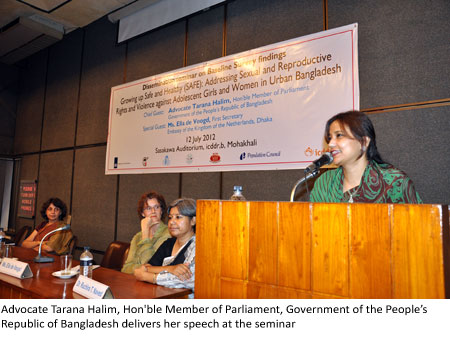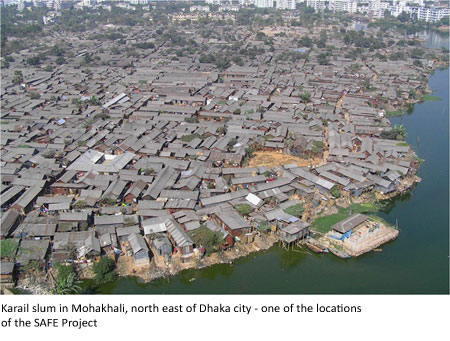http://www.icddrb.org/media-centre/news/4032-study-reveals-alarming-prevalence-of-gender-based-violence-in-dhakas-slums
Study Reveals Alarming
Prevalence of
Gender-Based Violence in Dhaka’s
Slums
A baseline study undertaken by icddr,b and Population Council in the slums of Mohakhali, Mohammadpur and Jatrabari reveals that women and girls’ sexual and reproductive health rights are consistently being violated, with gender-based violence occurring at alarming rates. According to the study, 76% of the women surveyed had endured physical or sexual abuse during the past 12 months, with 43% having suffered both physical and sexual abuse. 85% reported that their husbands restricted their access to health care.
The findings were shared at a seminar organised by the action research project Growing up Safe and Healthy (SAFE): Addressing Sexual and Reproductive Rights and Violence against Adolescent Girls and Women in Urban Bangladesh, which was held on Thursday, 12 July 2012 in the Sasakawa Auditorium. In her closing speech, Chief Guest, Advocate Tarana Halim, Hon'ble Member of Parliament, Government of the People’s Republic of Bangladesh commented that “We must implement existing laws to give the women of Bangladesh their rights.”
Dr. Ruchira Tabassum Naved, Principal Investigator of the SAFE project and Research Group Coordinator of the Gender, Health, Human Rights & Violence against Women Research Group (under the Centre for Equity and Health Systems) said, “Our findings clearly demonstrate high rates of child marriage and denial of other sexual and reproductive rights of the women and girls in the slums. We hope SAFE will be able to show which interventions are useful and which are not.”

Ms. Ella de Voogd, First Secretary, Embassy of the Kingdom of the Netherlands (EKN), Dhaka was present as special guest while the event was chaired by Dr. Tasnim Azim, Director of Centre for HIV & AIDS. Funded by the Embassy of the Kingdom of the Netherlands, the SAFE project is implemented by the Bangladesh Legal Aid and Services Trust, icddr,b, Marie Stopes Clinic Society, Nari Maitree (We Can Campaign) and Population Council.
The Study Design
The study aimed at obtaining pertinent baseline information on sexual and reproductive rights and violence against women in Dhaka slums. It included a qualitative study and surveys of two separate groups of men and women. The survey of girls and women included 4458 women aged 15 to 29, while the men’s survey included 1617 men aged 18 to 35. Qualitative data was collected through interviews of men, women, girls, key informants and focus group discussions.
Major findings and themes
The project’s baseline survey and formative research findings were presented on four themes related to sexual and reproductive health rights and gender-based violence in Dhaka slums. The findings were presented by researchers from icddr,b and The Population Council.
- Child marriage is highly prevalent in Dhaka’s slums. One-third of girls in the study were married before the age of 15. About 61% of marriages were arranged and 31% involved a dowry. It is common to find cases where girls and women were married without their consent. Researchers found that 30% of the women were not asked for consent in their marriage and 28% did not want to marry.
- An overwhelming majority of women had inadequate knowledge about both sexual and reproductive health rights. Denial of this information results in a myriad of sexual and reproductive health issues. For example, over half of women did not know about sexually transmitted diseases and an alarming 87% did not receive medical attendance during postnatal care within 42 days of delivery. This data supports the notion in Bangladesh that information about sexual health and reproductive rights is taboo.
- About 90% of women reported that they were exposed to controlling behaviour of the husbands and 85% reported that husbands restricted access to health care. In the last 12 months, 76% of women endured physical or sexual abuse, and 43% had endured both physical and sexual abuse. Even though abuse is so common, women rarely seek help.
- Unmarried adolescent girls also experience multiple forms of violence at home, in romantic relationships and in the community. Because circumstances in the slums have begun to shift to allow girls to become important contributors to family income, girls have become more mobile and independent. Unfortunately, these new roles have advanced more quickly than the traditional, patriarchal ideology that condones the control of girls through further restrictions and violence.
- In order to address the denial of sexual and reproductive rights and the high rates of gender-based violence, researchers recommended the following: 1) creating strong inter-agency and inter-disciplinary partnerships in order to change the cultural norms that inhibit sharing of information, knowledge and problems related to reproductive and sexual health rights, 2) addressing society’s violence-condoning attitude, 3) creating safe spaces that offer formal and informal support and are sensitive and specific to the needs of women and girls, and 4) testing different interventions focusing on the above.
Status of rights of girls and women in Bangladesh
Despite considerable improvements in a range of gender equality indicators in education and health, child marriage, early conception and gender based violence remain significant impediments to achieving gender equity in Bangladesh. The law provides for penalties for those responsible for marriage of girls aged under 18 but more than 60% of girls in the country continue to get married before they reach 18. Legal and policy reforms to address gender-based violence have been limited in impact because less than 2% of married women who have experienced physical violence seek any kind of remedy or service. The situation is considerably worse for women living in urban slums. Dire poverty, insecure living arrangements, frequent squatter evictions, weak social networks, the absence of civic society institutions, absence of public services and poor coordination among the services compound the vulnerability of young women.
The SAFE Project
Launched in March 2011, the action research project is designed to promote sexual and reproductive health and rights and reduce the violence suffered by adolescent girls and young women living in the slums of Dhaka. The project works with adolescent girls and boys, and young women and men as well as with the local community leaders in urban slums. It seeks to provide context-specific strategies for vulnerable adolescents to build their social and health assets, with the eventual goal of improving their sexual and reproductive health and reducing violence against women.

The SAFE project raises awareness about women’s and girls’ rights through a combination of messages on prevention, service provision and on proposed legal and policy reforms. The project includes quantitative and qualitative research. Qualitative research will offer rich data to inform all phases of programme implementation and analysis of outcomes. An experimental design will allow comparison of changes attributable to the programme. This research project will measure young people’s vulnerability, social capital, and specific reproductive health knowledge, skills and preventive behaviours.
The project establishes links and creates a strong network between legal services and reproductive and sexual health service providers, human rights and women’s rights advocates, research organisations, and the Ministry of Women and Children Affairs.
For details please contact Nasmeen Ahmed


No comments:
Post a Comment